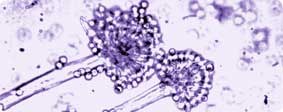 TED’s Matthew Trost reports from the World Science Festival‘s Sunday-afternoon session “Looking for the Laws of Life“:
TED’s Matthew Trost reports from the World Science Festival‘s Sunday-afternoon session “Looking for the Laws of Life“:
John Hockenberry moderated this discussion on how life works, what its prerequisites are and where else we might find it in the universe. Featuring synthetic biology expert Steven Benner, researcher and astrobiologist Maggie Turnbull and cosmologist-astrobiologist-physicist-author Paul Davies. A few of the interesting points:
+ Paul Davies talks about how we can specify what life is — when almost any definition still comes up with exceptions. Davies says life is information replication and processing. (Also, living systems tend to exhibit chirality.) He is interested in extremophiles — organisms which live in extreme environments, such as the waste pools of nuclear reactors. Liquid water, he says, seems to be the one indispensable requirement.
+ Steven Benner: While noting its importance for Earthly life, he hopes we move beyond the idea that water is the necessary condition for life everywhere. “I’m not a big fan of water,” he says. He argues that life is not “aided” by water, but that life is a constant process to in fact mitigate the destruction of self-sustaining systems by the force of erosion. The cells in your body are busy repairing this “water damage” every minute. There is also one major disadvantage to water: it boils. He points out that water is convenient as it holds salts, and the charges that define salts permit the living structures we know to exist.
+ Playing against Benner, Turnbull says she is going to be an advocate for water: we already know water works, why don’t we keep looking for it? She challenges Benner to come up with another substance whose phase-space (i.e. liquid) is as broad as that of water — which ranges 100 degrees.
+ Benner: the double helix of DNA seems to be a very inefficient structure. Why not a structure that replicates based on 2D layers of information, perhaps enclosed in crystal? He says, “When we invented the microscope, a whole new biosphere opened up.”
+ Benner asks, can we specify a level of planetary complexity where we can predict whether life could occur? First of all, we would need a place in the universe where we can construct planets. Second, the planet might have to be tectonically active. Drawing from Turnbull’s comments, he agrees that planetary systems are intertwined in the most crucial way with the emergence of life, but he is skeptical about the Gaia Hypothesis considered as anything more than a metaphor.
+ Maggie Turnbull asks, What signs of life can we find without actually going to these remotest places? She talks about using spectral chemical signals, but also about NASA’s new Kepler mission. She looks forward to a mission that would put a space telescope four-times the size of the Hubble into orbit, paired with a “star-shade” which would block the light from distant stars so we could discern small, Earth-like planets orbiting them. Turnbull distinguishes the analysis of life’s “behavior,” which is accounted for by evolution, versus its “structure,” which is perhaps accounted for by physics and the planetary environment. (“Life,” she says, “includes the planet it lives on.”) She stresses the “continuum of complexity” between very simple systems and very complex ones, and that definitions of life tend to fail because there is so much room for exceptions.
+ Davies says life elsewhere might be morphologically quite like life on Earth, because it would likely evolve around similar constraints: the need to fly, to swim, to harvest energy. He speculates whether life might emerge from quantum systems: “Q life.” When the name of the game is information, you can look in all sorts of places.